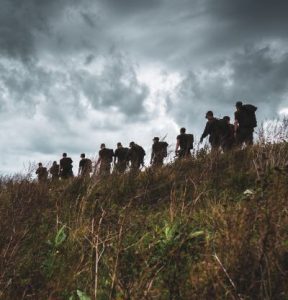When War came to the Hospital – Part Two
by an MMM Sister Unknown Location 21.08.2023
 The shelling started unusually early one morning. We knew that it was enemy shelling, and they seemed to be prepared to keep at it non-stop. For days now it had been coming nearer, but today it instilled fear into every heart.
The shelling started unusually early one morning. We knew that it was enemy shelling, and they seemed to be prepared to keep at it non-stop. For days now it had been coming nearer, but today it instilled fear into every heart.
When we went on duty in the hospital at 7.30am we were not greeted with the usual, cheerful welcome. Those who were well enough were fully dressed, awaiting orders to go to the front. Every man was on edge and alert. We took consolation from the fact that a large bridge, which we knew to be mined, lay between us and the advancing army. Retreating soldiers arrived in large numbers soon after we went on duty. They were exhausted, dejected, down-heartened men. They had spent weeks in the trenches without a break. The sound of shelling blasted their eardrums, and they were often without food or water or a night’s sleep.
Soon there was a tremendous explosion. Their helicopter was on a bombing mission, but exploded and disintegrated almost immediately. This dampened morale considerably. The casualties soon poured in, most of them suffering excruciating pain as well as extreme mental anguish. Many of them were deaf or dumb or both, from shell shock. Some were at death’s door. Others died on arrival, or shortly before it. The will to fight was gone. The men were completely played out and exhausted. Soon there would be another large explosion. We knew it was the bridge near the hospital. This meant that the army would have to re-group and change their position to attack. We continued to receive heavy casualties throughout the afternoon. Just before nightfall we received our orders.
Everyone was to leave the area before morning as it was within shelling range. We now joined the band of wandering refugees and had that most frustrating experience of being displaced persons. It was an education and taught us how little we really understood the drives and instincts, the anxiety and anguish which lay behind these people’s surface behaviour and emotional reactions. But our suffering was not as intense as the local people. There were many convents on the periphery of the battle zone where a warm welcome, a good meal and shelter always awaited us.
Our indigent refugees had to trek their weary way for many miles until, well out of the war zone, they would meet a refugee camp. There the conditions, by any standard, were often appalling. They were overcrowded, with bad sanitation, scanty food, and disease already prevalent. Or they would return to their village of origin. If, fortunately, it was in a peaceful area, where their kith and kin gladly shared their frugal meals and earthly possessions with them, pleased to know that at least a few women and children were safe. Some of these people had had to flee at least twice before.
We all shared the relief of being away, at least for the time being, from the noise of the battle front. There were no clouds of smoke in the distance, but we no longer had first-hand information of how the fighting was going. We all lived in fear and wonder. All, irrespective of creed or nationality, entertained a common desire that God would hasten the day when “mercy and faithfulness shall meet each other, and justice and peace shall embrace”.
SEE ALL BLOG POSTS
